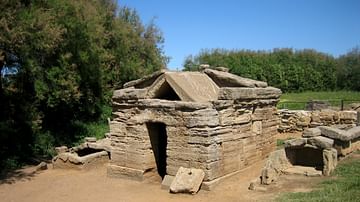Search
Search Results

Definition
Ancient Greek Government
Ancient Greece witnessed a wide variety of government systems as people searched for the answers to such fundamental questions as who should rule and how? Should sovereignty lie in the rule of law, the constitution, officials, or the citizens...

Definition
Populonia
Populonia (Etruscan name: Pupluna or Fufluna), located on the western coast of Italy, was an important Etruscan town which flourished between the 7th and 2nd century BCE. Rich in metal deposits and so noted for its production of pig iron...

Definition
Veii
Veii (modern name: Isola Farnese, in Etruscan: Vei), was an important Etruscan town located near the west coast of central Italy. Lying just 16 km north of Rome, it was the most southerly of the major Etrurian settlements. The prosperity...

Article
The Life of Diogenes of Sinope in Diogenes Laertius
Diogenes of Sinope (c. 404-323 BCE) was a Greek Cynic philosopher best known for holding a lantern to the faces of the citizens of Athens claiming he was searching for an honest man. He was most likely a student of the philosopher Antisthenes...

Definition
Agesilaus II
Agesilaus II (c. 445 – 359 BCE) was a Spartan king who won victories in Anatolia and the Corinthian Wars but who would ultimately bring total defeat to his city through his policies against Thebes. When Sparta lost the crucial battle of Leuctra...

Definition
Greek Archaic Period
The Greek Archaic Period (c. 800-479 BCE) started from what can only be termed uncertainty, and ended with the Persians being ejected from Greece for good after the battles of Plataea and Mykale in 479 BCE. The Archaic Period is preceded...

Definition
Italo-Ethiopian Wars
Italy occupied Ethiopia for five years, from 1935 to 1941, following a mass-scale invasion launched by the fascist dictator Benito Mussolini (1883-1945). However, Ethiopia had been a long-aimed colonial objective of Italy, which had already...

Definition
Continental System
The Continental System was a major blockade of British trade imposed by French Emperor Napoleon I from 21 November 1806 to 11 April 1814. It was designed to cripple the British economy, thereby forcing Britain out of the Napoleonic Wars (1803-1815...

Definition
Themistocles
Themistocles (c. 524 - c. 460 BCE) was an Athenian statesman and general (strategos) whose emphasis on naval power and military skills were instrumental during the Persian wars, victory in which ensured that Greece survived its greatest ever...

Article
Woodrow Wilson's Fourteen Points - A Plan for World Peace
The Fourteen Point Peace Programme of US President Woodrow Wilson (1856-1924) was presented to Congress on 8 January 1918 and outlined a new world order that would hopefully avoid another disaster like the still ongoing First World War (1914-18...